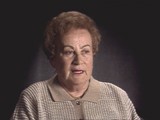You searched for: world war I
<< Previous | Displaying results 401-425 of 538 for "world war I" | Next >>
-
Children's art: Drawing of people in a garden
ArtifactAlice Goldberger (1897-1986) was born in Berlin, Germany. Trained as a youth-work instructor, she ran a shelter for disadvantaged children and their families. When Hitler came to power, Alice, who was Jewish, had to give up her post. She immigrated to England in 1939. When war broke out, Alice was interned on the Isle of Man as an enemy alien. While there, she organized a children's facility.Hearing of Alice's work in the camp, psychoanalyst Anna Freud (daughter of Sigmund Freud) intervened to secure her…
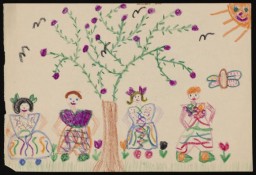
-
Istvan Geroe
ID CardIstvan was born to a Jewish family in the small agricultural city of Torokszentmiklos, about 65 miles from Budapest. Istvan worked for the Hungarian railroads during World War I, and afterwards earned a degree in pharmacology. In the 1920s Istvan married Barbara Nemeth and they settled in Torokszentmiklos. In 1929 the couple had a son, Janos. 1933-39: During the early 1930s, after the onset of the Depression, Istvan helped his father in the family's grain exporting business. In 1933 Istvan and Barbara…
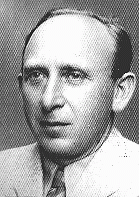
-
Lodz
ArticleNazi authorities established the Lodz ghetto in 1940. Learn about living conditions and forced labor in the ghetto, as well as deportations to and from there.
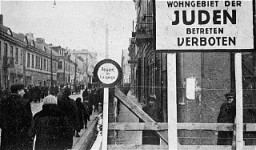
-
Remilitarization of the Rhineland
FilmProvisions of the 1919 Treaty of Versailles forbade Germany (defeated in World War I) to station armed forces in a demilitarized zone in the Rhineland—a region in western Germany bordering France, Belgium, and part of the Netherlands. The treaty stipulated that Allied forces—including US troops—would occupy the region. In a blatant violation of the treaty, on March 7, 1936, Hitler ordered German troops to reoccupy the zone. Hitler gambled that the western powers would not intervene. His action…
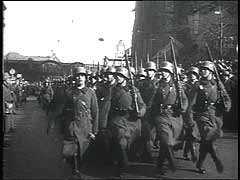
-
Resistance in the Smaller Ghettos of Eastern Europe: Glossary
ArticleLearn more about the Holocaust Encyclopedia’s key terms and selected youth movements related to resistance in the smaller ghettos of eastern Europe.
-
Wannsee Conference and the "Final Solution"
ArticleAt the Wannsee conference of January 1942, Nazi Party and German government officials gathered to coordinate implementation of the “Final Solution to the Jewish Question.”
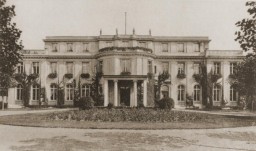
-
Reich Security Main Office (RSHA)
ArticleThe Reich Security Main Office (RSHA), created by Heinrich Himmler, brutally coordinated and perpetrated many aspects of the Holocaust.
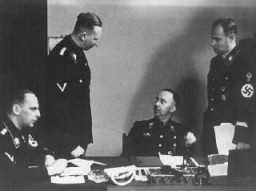
-
Inauguration of Paul von Hindenburg as President of Germany
Timeline EventMay 12, 1925. On this date, German Field Marshal Paul von Hindenburg is inaugurated, becoming the last president of the Weimar Republic.
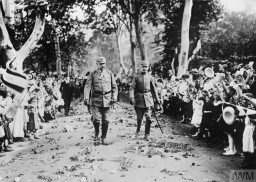
-
Wilek (William) Loew describes Budapest after he escaped from the Lvov ghetto and before the German occupation of Hungary
Oral HistoryWilek was the son of Jewish parents living in the southeastern Polish town of Lvov. His family owned and operated a winery that had been in family hands since 1870. Wilek's father died of a heart attack in 1929. Wilek entered secondary school in 1939. Soon after he began school, World War II began with the German invasion of Poland. Lvov was in the part of eastern Poland annexed by the Soviet Union. Although the Soviets took over Wilek's home and the family business, Wilek was able to continue his…
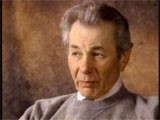
-
Wilek (William) Loew describes forced labor in Lvov
Oral HistoryWilek was the son of Jewish parents living in the southeastern Polish town of Lvov. His family owned and operated a winery that had been in family hands since 1870. Wilek's father died of a heart attack in 1929. Wilek entered secondary school in 1939. Soon after he began school, World War II began with the German invasion of Poland. Lvov was in the part of eastern Poland annexed by the Soviet Union. Although the Soviets took over Wilek's home and the family business, Wilek was able to continue his…
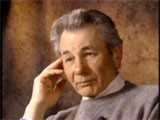
-
Belle Mayer Zeck describes working conditions and staffing at Nuremberg during the postwar trials
Oral HistoryBelle Mayer trained as a lawyer and worked for the General Counsel of the US Treasury, Foreign Funds Control Bureau. This bureau worked to enforce the Trading With the Enemy Act passed by Congress. In this capacity, Mayer became familiar with the German I. G. Farben chemical company, a large conglomerate that used slave labor during World War II. In 1945, Mayer was sent as a Department of Treasury representative to the postwar London Conference. She was present as representatives from the Allied nations…
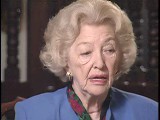
-
Sobibor
ArticleTo carry out the mass murder of Europe's Jews, the Nazis established killing centers that used assembly-line methods of murder. Sobibor was among these facilities.
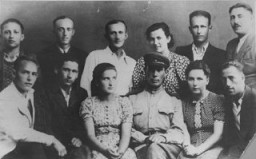
-
Benjamin (Beryl) Ferencz describes preparations for trials before military tribunals
Oral HistoryBen was born in a small village in the Carpathian Mountains of Transylvania in Romania. When he was an infant, his family moved to the United States. Ben attended Harvard University, where he studied criminal law. Ben graduated from Harvard University Law School in 1943. He joined a US anti-aircraft artillery battalion that was training in preparation for an Allied invasion of western Europe. At the end of World War II in Europe, Ben was transferred to the war crimes investigation branch of the US Army. He…
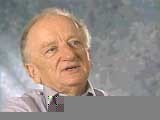
-
1944: Key Dates
ArticleExplore a timeline of key events during 1944 in the history of Nazi Germany, World War II, and the Holocaust.
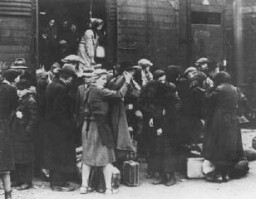
-
Mauthausen
ArticleThe Mauthausen concentration camp was established following the Nazi incorporation of Austria in 1938. Learn about the harsh conditions in the camp.
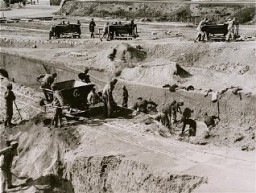
-
Bulgaria
ArticleBulgaria joined the Axis alliance on March 1, 1941, after the Germans offered them Greek territory in Thrace. Learn about Bulgaria during WWII and the Holocaust.
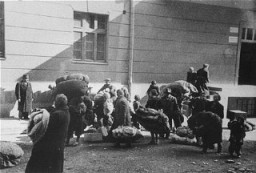
-
Norbert J. Yasharoff describes the trial and sentencing of a Jewish man falsely charged with economic crimes
Oral HistoryAnti-Jewish measures took effect in Bulgaria after the beginning of World War II. In March 1941, Bulgaria joined the Axis alliance and German troops passed through Sofia. In May 1943, Norbert and his family were expelled to Plevin in northern Bulgaria, where they stayed with relatives. After the advance of the Soviet army in 1944, Norbert and his family returned to Sofia.
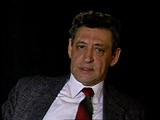
-
Hidden Children: Hardships
ArticleParents, children, and rescuers faced daunting challenges once the decision was made for a child to go into hiding during the Holocaust.
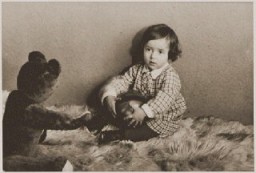
-
The History of the Swastika
ArticleThe swastika is an ancient symbol that was in use in many different cultures for many years before Adolf Hitler made it the centerpiece of the Nazi flag.
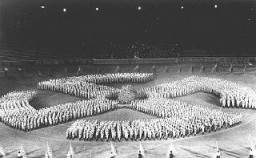
-
Charlene Schiff describes the German invasion of her town, Horochow, in the summer of 1941
Oral HistoryBoth of Charlene's parents were local Jewish community leaders, and the family was active in community life. Charlene's father was a professor of philosophy at the State University of Lvov. World War II began with the German invasion of Poland on September 1, 1939. Charlene's town was in the part of eastern Poland occupied by the Soviet Union under the German-Soviet Pact of August 1939. Under the Soviet occupation, the family remained in its home and Charlene's father continued to teach. The Germans…
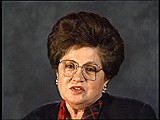
-
Barbara Marton Farkas describes the death march from the Gross-Rosen camp in Germany
Oral HistoryBarbara was born in the province of Arad in northern Transylvania, Romania. She went to school until the Hungarian army occupied the area in 1940 and she was no longer allowed to attend. After the Germans occupied Hungary in 1944, discrimination against Jews intensified. Barbara and her family were forced into the Oradea ghetto. She worked in the ghetto hospital until she was deported to the Auschwitz camp. At Auschwitz, she worked in the kitchens to receive extra food. She was deported to another camp,…
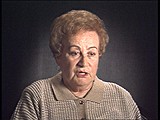
-
Władysław Bartoszewski discusses Żegota
Oral HistoryWładysław Bartoszewski (1922–2015) was a co-founder and member of the Council for Aid to Jews, codenamed “Żegota.” Żegota was a clandestine rescue organization of Poles and Jews in German-occupied Poland. Supported by the Polish government-in-exile, Żegota coordinated efforts to save Jews from Nazi persecution and murder. It operated from 1942 to 1945. After World War II broke out in 1939, Władysław worked as a janitor at a Polish Red Cross clinic. In the fall of 1940, Władysław was caught…
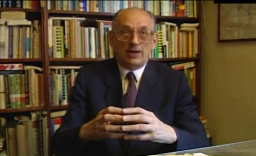
-
Magnus Hirschfeld
ArticleA leading researcher of sex, sexuality, and gender, German Jewish doctor Magnus Hirschfeld was forced to live in exile after the Nazi rise to power.
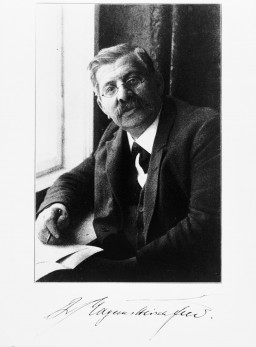
-
Joseph Goebbels
ArticleJoseph Goebbels, Nazi politician, propagandist, and radical antisemite, was Reich Minister for Propaganda and Public Enlightenment from 1933 until 1945.
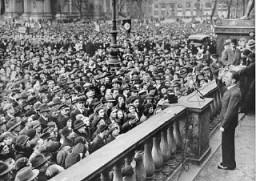
-
Barbara Marton Farkas describes deportation from Hungary to Auschwitz
Oral HistoryBarbara was born in the province of Arad in northern Transylvania, Romania. She went to school until the Hungarian army occupied the area in 1940 and she was no longer allowed to attend. After the Germans occupied Hungary in 1944, discrimination against Jews intensified. Barbara and her family were forced into the Oradea ghetto. She worked in the ghetto hospital until she was deported to the Auschwitz camp. At Auschwitz, she worked in the kitchens to receive extra food. She was deported to another camp,…
